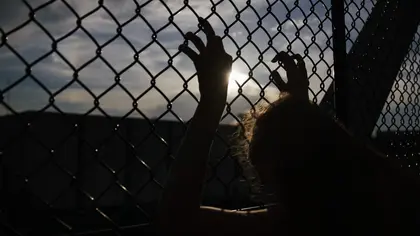On July 19, U.S. Secretary of State Anthony Blinken warned that Russia’s war in Ukraine could see an upsurge in human trafficking over the next year as more people are forced to leave their homes.
In his introduction to the 2022 “Trafficking in Persons” report, Blinken stressed that the annual publication comes “in the midst of an unprecedented humanitarian crisis.” He also added that the events in Ukraine will contribute to the aggravation of food security around the world.
JOIN US ON TELEGRAM
Follow our coverage of the war on the @Kyivpost_official.
“We are deeply concerned about the risks of human trafficking faced by internally displaced persons as a result of the war, as well as those fleeing Ukraine, approximately 90% of whom are women and children. Food insecurity and other broader consequences of the Russian war exacerbate the risks of human trafficking around the world,” he stressed in the report.
The report is presented only for the first month of the war in Ukraine — from April 1, 2021 to March 31, 2022. However, it states that “the Russian government’s full-scale invasion of Ukraine in February 2022 created significant vulnerability to human trafficking for millions of refugees fleeing Ukraine.”
The 2021 report identified Russia as not meeting minimum standards for combating human trafficking and that the country “does not make significant efforts to do so.” The report went on to highlight Russia as a country with a government that has “armed forces, police or other security forces, or government-sponsored armed groups, that recruit or use child soldiers.” Russia was also mentioned as one of 11 countries in which government officials participated in human trafficking.

Russian Citizens Launch Campaign to Find Loved Ones Behind Front Lines
Meanwhile, on July 12, the Ministry of Foreign Affairs of Ukraine published a Facebook article on the risks of human trafficking:
“One of the most terrible violations of human rights in the modern world remains the crime of human trafficking. Anyone can suffer from exploitation, regardless of age, gender and profession. However, human traffickers prey mostly on those who arrive from another country, do not know the language, or have left their previous place of residence due to a crisis,” the message reads.
In addition, for the first time in history, the European Union (EU) activated the Directive on temporary protection, which gives forced migrants from Ukraine access (for example) to the labor market and health care, which “reduces the vulnerability and risk of human trafficking.” This was reported by the EU coordinator for combating human trafficking, Diane Schmitt, in an interview with the German publication Die Welt on July 4.
However, according to Schmitt, there is currently no evidence that there are significantly more Ukrainian women victims of human trafficking than before the war. She indicated that Europol, Frontex, national authorities and organizations are working closely with her office.
“When Russia attacked Ukraine, alarm bells rang for us because Ukrainian women have been one of the main victims of human trafficking in the EU for many years. It is mostly about sexual exploitation, but sometimes also about forced labor. In a situation where many women without husbands and children are fleeing to Poland, Romania and other EU countries, it became important to react quickly – to establish preventive programs, launch information campaigns and activate all security forces and the public about the dangers,” said Schmitt.
Trafficking instigated by Russia
However, Ukrainians are trafficked not only in other countries. Russia systematically operates “filtration camps” in occupied territories and forcibly deports Ukrainians.
In his July 13 statement, Blinken drew attention to the following grim statistics:
“According to estimates from various sources, in particular from the Russian government, the Russian authorities interrogated, detained and forcibly deported to Russia, often to isolated regions in the Far East, from 900,000 to 1.6 million citizens of Ukraine, including 260,000 children,” he said.
The message states that Moscow gives Ukrainian children up for adoption, while thousands of other people “disappear.” Furthermore, Russian authorities are deliberately separating Ukrainian children from their parents and abducting children from orphanages before giving them up for adoption in Russia.
Blinken called on Russia to release detainees, allow those forcibly removed to return home safely, and allow independent observers into so-called “filtration” camps and places of forced deportation.
“Eyewitnesses and survivors of filtering operations, detention, and forced deportation report frequent threats, harassment, and incidents of torture by Russian security forces,” Blinken said in his statement.
Russia, in turn, denies the persecution of civilians in Ukraine. The Kremlin for its part says that Russia offers humanitarian aid to those who want to leave Ukraine.
You can also highlight the text and press Ctrl + Enter










